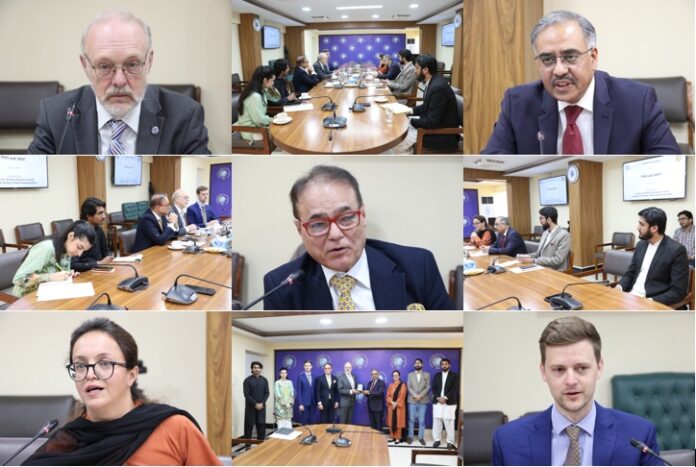- Advertisement -
ISLAMABAD, Apr 28 (APP):The Institute of Strategic Studies Islamabad (ISSI) on Monday hosted a three-member delegation led by Dr. Franz Baumann, President of the Academic Council on the UN System (ACUNS), for an engaging and insightful discussion on major global challenges, including climate change, migration, and evolving security dynamics.
Other members of the delegation included Dr. Afsar Rathor, former UN Director across several UN agencies and currently President of the Austria-based LIOS-SOIL Organization; and Mr. Michael Zinkanell, Director of the Austrian Institute for European and Security Policy (AIES), said a press release.
In his welcome remarks, Director General ISSI Ambassador Sohail Mahmood emphasized the growing need to build bridges between academia and the policy community. He stressed that as the world faces unprecedented transnational challenges, think-tanks must act as vital platforms to advance collective understanding and promote evidence-based policymaking.
Ambassador Sohail also highlighted Pakistan’s commitment to comprehensive security, where climate change, human security, and migration now feature prominently alongside traditional security issues. He also shared Pakistan’s perspective on myriad dimensions of climate change and global response, multiple aspects of migration issue, and importance of effective pathways for legal migration.
Dr. Franz Baumann by sharing his reflections on climate change as the gravest threat facing humanity. He underlined that the global climate crisis is not evenly distributed but affects all nations, and urgently requires a shift away from fossil fuels.
Dr. Baumann explained that the principle of “common but differentiated responsibilities” remains central, and that greater attention must be paid to historical emissions and per capita energy consumption disparities. He further noted the importance of involving academia, policymakers, and diplomats in a unified effort, mentioning that the Academic Council on the UN System aims to bring its prestigious annual conference to Lahore in 2027—a potential landmark event for the region.
Mr. Michael Zinkanell highlighted the strategic shifts in European security policy subsequent to the Russia-Ukraine conflict, noting the growing importance of the ‘Indo-Pacific’ for geopolitics, security, and economic development. He emphasized the complex link between climate change, displacement, and political instability, stressing the need for stronger regional cooperation and proactive governance.
Dr. Afsar Rathor addressed climate and migration challenges, sharing his work on promoting regenerative agriculture in Africa and warning about the rising threats of desertification and food insecurity. He cautioned about the scale of illegal migration, particularly among skilled Pakistanis, and underscored the need for greater awareness and institutional support to help youth access safe and legal migration pathways to Europe.
The ISSI team, comprising senior researchers and experts, engaged actively with the delegation. They presented Pakistan’s efforts toward climate adaptation, its leadership role in climate negotiations, and national initiatives like the National Security Policy’s recognition of non-traditional security threats.
In his concluding remarks, Ambassador Sohail Mahmood, Director General ISSI, underscored the value of continued dialogue and collaboration between ISSI and the visiting institutions — the ACUNS, the LIOS-SOIL Organization, and the AIES.
Both sides expressed strong interest in formalizing institutional partnerships to promote joint research projects, academic exchanges, and policy dialogues, particularly on shared priorities such as climate governance, migration management, and evolving global security dynamics.

